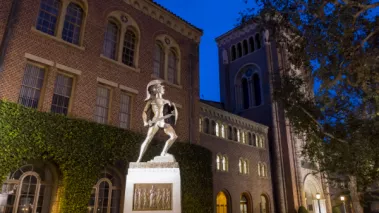Table of Contents
USC finally updates free expression policy it promised to fix. It’s even worse now.

(Kit Leong / Shutterstock)
FIRE has been warning the University of Southern California for the better part of two years that its “Free Expression and Dissent” policy improperly restricts student expression. Under the policy, students are required to notify the university weeks in advance and receive approval to speak in some open areas of campus.
USC has said it agrees with FIRE’s analysis and that the policy needed to be improved — and would be soon.
That was back in January 2019.
And now, much to FIRE’s disappointment, a long-awaited update was finally made — only to worsen the defects USC committed to cure.
USC is a private institution that makes strong free speech promises to students. That’s why, in January 2019, we first alerted university administrators that their Free Expression and Dissent policy had been named as our Speech Code of the Month. Our chief concern was that the policy references a Student Organization Event Approval process that requires students to register weeks in advance — and receive official approval — before they can engage in expressive activities in open, outdoor areas of campus. At the time, two weeks advance notice was required.

Just one day after our 2019 letter, FIRE received an encouraging response from Ainsley Carry, who was then USC’s Vice President for Student Affairs, committing to change the policy later that year.
“Given that the current language appears to have raised concerns, we will clarify the wording in the upcoming 2019-2020 version of the policy,” Carry wrote. “Students will not be required to provide two-week notice of their intent to hold demonstrations.”
In January 2020, FIRE wrote to USC again after we got word that the policy not only remained on the books, but had been enforced to stop a student group from speaking in a common area. What’s more, the notice period had been extended to five weeks.
Under USC’s policy, students wanting to speak out on George Floyd's death would still be waiting for official approval to do so.
USC again responded, noting that the university had new leadership — President Carol Folt and Provost Charles Zukoski — who had been unaware of the policy.
“We [will] review this immediately,” a USC spokesperson replied.
This week, the policy was updated again, with references to special accommodations for COVID-19. But instead of curing the defects as promised, the notice period was again extended, this time to a jaw-dropping eight weeks.
As we previously explained to USC, by placing a burdensome, two-month waiting period on any campus protest or demonstration, the university has effectively banned all spontaneous expressive activity. USC’s policy would entirely prevent an individual student or student group from organizing a spontaneous, unregistered rally or protest — which is oftentimes necessary to respond effectively to immediate or still-developing news.
In 2019, when the waiting period was two weeks, we raised concerns that by “requiring students in these circumstances to wait a minimum of fourteen days to demonstrate on campus, USC robs students of the immediacy—and, in all likelihood, the effectiveness—of their message.” With a five or eight week waiting period, that outcome is all but guaranteed.
Consider that the death of George Floyd on May 25 — which has prompted unprecedented nationwide protests — happened just over seven weeks ago. Under USC’s policy, students wanting to speak out on that topic would still be waiting for official approval to do so.
In our latest letter to USC today, we ask that the university commit to changing this onerous policy once and for all:
We understand the unprecedented challenges presented by the COVID-19 pandemic and recognize that the university has critical interests in preserving its students’ health. However, safety measures implemented during crises too often outlast those crises. Accordingly, we ask that USC: (1) re-evaluate whether eight-weeks’ notice for students to engage in expressive activity is necessary to meet the university’s needs; and (2) establish a periodic timeframe in which this restriction will be reviewed and, once a limitation is no longer justified by the health emergency, will be abandoned.
FIRE’s Policy Reform team stands ready to provide additional guidance to USC, free of charge, to help them make this important — and long overdue — change.
Does your college or university have a policy that infringes student or faculty speech rights? Let us know! Email speechcodes@thefire.org and we’ll be in touch.
Recent Articles
FIRE’s award-winning Newsdesk covers the free speech news you need to stay informed.

AI is new — the laws that govern it don’t have to be

Defending free speech: FIRE and Substack partner to protect writers in America

Brown University targets student journalist for sending DOGE-like emails
